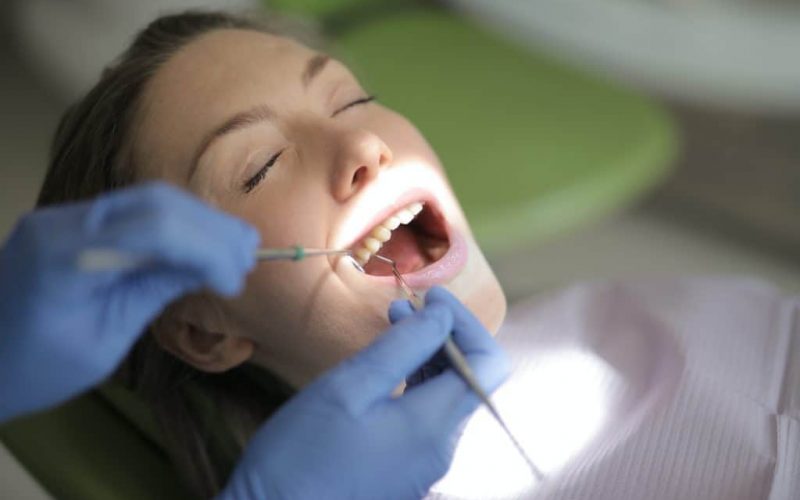Dentistry is a career path that requires dedication, hard work, and proper education to keep smiles healthy. Knowing what to major to be a dentist in is critical for your success if you are considering pursuing dentistry as your profession.
With technological advancements and changing industry demands, staying updated on the latest trends and requirements is essential.
This complete guide will provide all the necessary information on what to major in as a dentist in 2024. This comprehensive article will cover everything from undergraduate majors to postgraduate programs required for dentistry.
We’ll explore the skills needed for success and discuss various specializations you can pursue within this field.
Table of contents
What Does a Dentist Do?
A dentist is a healthcare professional who focuses on oral health. They examine teeth and gums, clean teeth, take X-rays, fill cavities, perform root canals, extract teeth, and provide orthodontic and prosthodontic treatments. They also educate patients about oral hygiene and promote overall dental health.
Dentists primarily focus on maintaining good oral health and helping patients achieve healthy and attractive smiles. Here are some of the main tasks and responsibilities of a dentist:
1. Oral Examinations
Dentists thoroughly examine a patient’s teeth, gums, and mouth to assess their oral health status. They look for signs of tooth decay, gum disease, oral cancer, and other oral conditions.
2. Dental Cleanings
Dentists or dental hygienists remove plaque, tartar, and stains from teeth during routine cleanings. They may also instruct patients on proper oral hygiene techniques, such as brushing and flossing.
Read Also: 21+ Best College Dorm Essentials for Guys: The Ultimate Guide to Practical Living
3. Dental X-rays
Dentists use X-rays to get a detailed view of the teeth, jawbone, and other structures that are not visible during a visual examination. X-rays help diagnose dental issues like cavities, impacted teeth, and bone loss.
4. Fillings and Restorations
Dentists treat cavities by removing decayed portions of teeth and filling them with dental materials, such as composite resin, amalgam, or porcelain. They may also repair damaged teeth using dental crowns, bridges, or implants.
5. Root Canal Therapy
When a tooth’s pulp (the innermost part of the tooth) becomes infected or inflamed, dentists perform root canal treatment. This involves removing the infected pulp, cleaning the root canal, and sealing it to prevent further infection.
6. Tooth Extractions
Read Also: What Is the Danger of Taking a Variable Rate Loan as a College Student?
7. Orthodontic Treatment
Some dentists specialize in orthodontics and provide treatment to correct teeth and jaw misalignments. This often involves braces, retainers, or other orthodontic appliances to straighten teeth and improve the bite.
8. Prosthodontic
Dentists may also specialize in prosthodontics, which involves restoring and replacing missing teeth. They may create and fit dental bridges, dentures, or implants to restore oral function and aesthetics.
Dentists extract teeth that are severely damaged, decayed, or impacted. They may also remove wisdom teeth (third molars) that are causing problems or have the potential to cause problems in the future.
9. Oral Health Education
Dentists educate patients on proper oral hygiene practices, diet, and nutrition for good health and regular dental check-ups. They provide personalized advice and recommendations to help patients maintain healthy teeth and gums.
Qualities to Have for Aspiring Dentists
Aspiring dentists should possess academic abilities, interpersonal skills, and personal qualities to excel in their profession. Here are some essential attributes that can contribute to success as a dentist:
1. Strong Academic Aptitude
Dentistry requires a solid academic foundation, so aspiring dentists should have strong analytical and problem-solving skills.
Understanding the sciences, including biology, chemistry, and physics, is crucial. Attention to detail and applying theoretical knowledge to practical situations are also significant.
2. Manual Dexterity
Dentistry involves performing delicate procedures in a small, confined space. Dentists need excellent hand-eye coordination and fine motor skills to manipulate dental instruments and perform precise tasks in the oral cavity.
3. Communication and Interpersonal Skills
Dentists interact with patients of various ages and backgrounds, so practical communication skills are vital. Explaining procedures, treatment options, and oral health instructions clearly and compassionately helps establish trust and ensures patient cooperation.
Read: What Percentage Of Pupils Pass The 11 Plus Exams Yearly
4. Empathy and Compassion
Dentistry can be an anxiety-inducing experience for many patients. Dentists should have empathy and compassion to understand patients’ fears and concerns and provide emotional support to help them feel comfortable during dental visits.
5. Professionalism and Ethical Behavior
Dentists must adhere to high professional and ethical standards. Maintaining patient confidentiality, demonstrating integrity, and displaying professionalism in all aspects of their practice are essential qualities for aspiring dentists.
6. Critical Thinking and Problem-Solving Skills
Dentists often encounter complex oral health issues that require critical thinking and problem-solving abilities. They must be able to diagnose problems, develop appropriate treatment plans, and adapt them as necessary.
7. Time Management and Organization
Dentists handle multiple patients and appointments throughout the day. Effective time management and organizational skills are crucial for maintaining a well-structured schedule, attending to patients promptly, and managing administrative tasks efficiently.
8. Continuous Learning and Adaptability
Dentistry is an evolving field, with new technologies, techniques, and research emerging regularly. Aspiring dentists should have a thirst for knowledge, a commitment to lifelong learning, and the ability to adapt to advancements in the field.
9. Business Acumen
Many dentists operate their practices or work in a business environment. Understanding basic business principles, including financial management, marketing, and practice management, can contribute to a successful dental career.
10. Professional Collaboration
Dentistry often involves collaborating with other dental professionals, such as dental hygienists, orthodontists, and oral surgeons. Working effectively in a team and collaborating is essential for comprehensive patient care.
Developing these qualities can help aspiring dentists excel and provide quality oral healthcare to their patients.
Read Also: What is Double Major? How does it Work in 2024?
What is the Job Outlook for Dentists?
The job outlook for dentists is generally positive, with favorable prospects for employment. However, it’s important to note that job availability and demand can vary by geographic location and the overall state of the economy. Here are some key factors to consider regarding the job outlook for dentists:
1. Growing Demand
The demand for dental services will continue increasing due to several factors. Firstly, the aging population will likely require more dental care, as older individuals tend to have a higher incidence of oral health issues.
Additionally, as awareness of the connection between oral health and overall health grows, more people seek preventive dental care.
2. Increasing Emphasis on Preventive Care
With a focus on preventive care, there is a greater emphasis on regular dental check-ups, cleanings, and early intervention. This trend contributes to increased demand for dental services and ongoing oral healthcare.
3. Access to Care
While the demand for dental services is rising, access to dental care remains a concern in some areas, particularly underserved communities. Efforts are being made to address this issue, which may increase dentists’ opportunities in these areas.
Read Also: How To Hang Curtains In A Dorm Like A Pro: Easy Steps
4. Specialization Opportunities
Dentistry offers specialization options, such as orthodontics, oral surgery, periodontics, and pediatric dentistry. Pursuing a specialization can provide dentists with niche career opportunities and enhance their earning potential.
5. Technological Advances
The dental field continues to benefit from technological advancements, such as digital imaging, CAD/CAM technology, and dental lasers. Dentists who stay up-to-date with these advancements and integrate them into their practice may have a competitive edge in the job market.
6. Workforce Supply and Retirement Patterns
The retirement of older dentists can create job openings and opportunities for newly trained dentists. Additionally, workforce supply dynamics can vary across regions, which may impact the availability of dental positions.
Read Also: What Is the Danger of Taking a Variable Rate Loan as a College Student?
What to Major in to Be a Dentist in 2024
To become a dentist, you can choose a variety of majors for your undergraduate studies. While no specific major is required for dental school admission, most aspiring dentists choose one that fulfills the prerequisite courses while aligning with their interests and strengths. Here are some common majors that students pursue:
1. Biology
To be a dentist, a major in biology provides a strong foundation in the life sciences, including courses in anatomy, physiology, microbiology, and genetics. These subjects are relevant to the study of dentistry and can help you understand the human body and oral health.
2. Chemistry
Chemistry is collected as a major to be a dentist. A chemistry significant focuses on studying chemical processes, including general, organic, and biochemistry courses. This major can provide a solid background in the chemical principles that underlie dental materials, pharmacology, and biomaterials used in dentistry.
3. Biochemistry
Biochemistry is also counted as a major to be a dentist as it combines the principles of biology and chemistry and delves into the molecular aspects of life processes. This principle can benefit the dental school, covering protein structure, enzymology, and metabolism.
4. Health Sciences/Public Health
Another on the list of majors to be a dentist is Health Sciences. Majors in health sciences or public health can provide a broader perspective on healthcare, including topics related to epidemiology, health policy, and community health. These majors can be valuable for dentists interested in public health dentistry or community-based practice.
5. Psychology/Sociology
Psychology or Sociology is counted as a major to be a dentist. Some students opt for psychology or sociology majors to better understand human behavior and social factors influencing health. These fields can help develop practical communication skills and address patient needs in a dental practice.
See this: Is a Nursing Degree Hard? | 2024 Expert Tips
Can I pursue dentistry if I didn’t choose a science major in undergraduate studies?
Yes, it is possible to pursue dentistry even if you didn’t choose a science major during your undergraduate studies.
Many dental schools accept applicants from diverse academic backgrounds. However, you will likely need to complete additional science coursework to meet the prerequisite requirements of dental schools.
FAQs
To become a dentist in 2024, you should typically pursue a major in a science-related field. Common undergraduate majors for aspiring dentists include biology, chemistry, biochemistry, or other health-related sciences. These majors provide a strong foundation in the sciences and the necessary prerequisites for dental school.
While a bachelor’s degree is not always a strict dental school admission requirement, most applicants hold a bachelor’s degree. Most dental schools prefer applicants with a bachelor’s degree, as it demonstrates a commitment to completing a rigorous academic program. However, some dental schools may accept students who have completed the necessary prerequisite coursework without a bachelor’s degree. It’s essential to check the admission requirements of the dental schools you plan to apply to.
While it is possible to major in a subject outside of the sciences and still apply to dental school, it may require additional coursework to fulfill the necessary prerequisites. It’s essential to carefully plan your coursework and consult with pre-dental advisors to ensure you complete all the required science courses. Non-science majors must take additional science classes to meet the dental school prerequisites.
Most students do not pursue advanced degrees, such as a master’s or Ph.D., before applying to dental school. Dental schools primarily evaluate applicants based on undergraduate coursework and prerequisites. While advanced degrees can provide additional knowledge and research experience, they are optional for admission to dental school.
Conclusion
Becoming a dentist requires a rigorous academic journey and specialized training. Choosing the right major can set you on the path to success. While there is no one “right” major for dentistry, science and math-based majors like biology, chemistry, and physics are highly recommended. Students should also seek opportunities for hands-on dentistry experience through internships or shadowing programs.
Ultimately, deciding which major to pursue should be based on your interests and strengths. With careful planning and hard work, a rewarding career in dentistry is within reach. Start exploring your options today!
It’s crucial to research the specific requirements of the dental schools you are interested in and work closely with pre-dental advisors to develop a plan for completing the necessary science coursework.
References
- bestdegreeprograms.org – What to Major in to Become a Dentist
- bemoacademicconsulting.com – How to Become a Dentist


